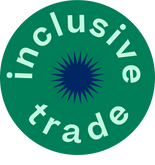Inclusive Trade Sustainability statement
This statement is our simple attempt to put in writing what we do at Inclusive Trade to ensure sustainability within our operations and supply chains.
OUR FOUNDATIONS ARE BUILT AROUND SUSTAINABILITY AND ETHICAL TRADE.
Our mission is to transform the retail industry as we know it, towards a more sustainable, transparent and accountable industry. We seek to challenge mainstream practices by applying our shopbyimpact ® business model that focuses on transparency and accountability while connecting small and micro businesses and artisan products to consumers and businesses.
Our transformational business model relies on three pillars. These are the SDG 2030 goals explained below. Our model focuses on advancing these goals and in the process providing a level playing field for micro and small independent brands:
- SDG 5 Gender Equality: Inclusive Trade is a channel to supporting and engaging women-led and managed businesses. We focus on supporting diversity and provide access for women led and managed businesses to other like-minded designers, makers and entrepreneurs. We believe in connecting our artisans to role models who promote fundamental values of gender equality.
- SDG12 Responsible Consumption & Production: Inclusive Trade is committed to reducing waste generation through prevention, reduction, recycling and reuse. We are constantly working with our suppliers to find packaging solutions that are multifunctional and have everyday use once they have fulfilled their initial task of ferrying your purchases safely to you. Inclusive Trade is also committed to increasing awareness on responsible consumption by consumers and corporates.
- SDG 13 Climate Action: Inclusive Trade educates and encourages all suppliers to reduce waste in their production processes and actively promotes the creation of a circular economy. Inclusive Trade works closely with several global partners to include and build the capacity of women, youth and marginalised communities to create sustainable and environmentally-friendly supply chains.
These three pillars are key to establishing sustainable business practices. Not only do they promote environmental sustainability but also social and economic empowerment. These pillars guide our business practices and decisions. By abiding by them we create a strong culture around sustainability for all our stakeholders and support the growth and prosperity of Inclusive Trade.
SUSTAINABILITY IN OUR RELATIONSHIPS
WHO WE WORK WITH
We partner with ethical and sustainable brands that are compatible with, and well aligned to, our guiding principles. A key aspect of our partnerships is supporting brands to become the best version of themselves and strive for ambitious and impactful sustainability goals.
We work with brands that demonstrate transparency of sourcing and ethical product development. The story behind each maker or business, and how they align to our pillars, is showcased on our platform. Not only does this ensure complete consumer trust but it allows customers to take ownership of the impact of each purchase and deepen their knowledge on sustainable practices.
Our sustainability actions do not follow a tickbox or end of the pipeline approach; sustainability is ingrained and a priority at all stages of our activities.
SUSTAINABILITY IN OUR ACTIONS
HOW WE WORK
Our action and sustainability commitments are not constraint to engagement only on our platform. It is our policy to minimise the impact of the Inclusive Trade´s operations on the environment both internally within our team and externally with clients and our business partners. We do this by implementing the following actions:
- Full transparency of sourcing and ethical product development to ensure complete consumer trust.
- Minimise waste by evaluating operations and ensuring they are as efficient as possible. We offer sustainable packaging and advice on sustainable packaging to our brands.
- We promote waste minimisation: Re-use, recovery and recycling, as appropriate
- Knowledge is a key driver of action: We engage and inform our stakeholders in a multitude of ways both, online and through active participation and engagement through relevant events and activities.
- Creating and sharing educational resources with our subscribers and brands: This covers a broad range of topics from how to identify and understand the environmental footprint of textiles, guides on responsible consumption, recycling and offering training on supply chain practises to build more transparent and traceable chains.
- Engaging in public discourse: Inclusive Trade is involved in public discourse by taking part in discussion panels, trade show, events and market fairs. We have been invited to present our work at the World Economic Forum (WEF) and have been present in DAVOS (January 2019). We have been regularly invited to participate and to present at the WTO Public Forums (2018 and 2019). We have also been invited to present online on various forums focussed discussing and advising on best practises for MSMES (micro and small medium enterprises) and have been involved in advising on policy discussions at international organisations.
- Referencing and raising awareness on the United Nations Sustainable Development Goals (SDGs)
- We provide brands with our bespoke assessment tools and encourage all brands to join us by starting their vendor journey with us using our 'Shop by Impact ®' model. Furthermore, we make available for our brands our bespoke self-impact assessment where they can assess their impact and grow through a continuous improvement process.
- We are verified vendors to the FAO of United Nations, as well as a verified vendor to the World Trade Organization (WTO). Furthermore, we are a Social Enterprise UK supporting member. We have strong ambitions for the future. We are currently going through the impact assessment process to become B Corp certified.
- We continue to push ourselves to better ourselves and our own practises. We remain engaged with stakeholders both, locally and globally to focus on an agenda where sustainability and ethical trade become the norm, not the exception.
At Inclusive Trade, sustainability guides our actions. We are committed to responsible transparent and traceable business action. We strive for our business model to challenge mainstream business practice and aim to inspire a shift to sustainable and responsible consumption for all.
